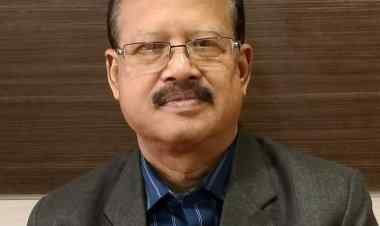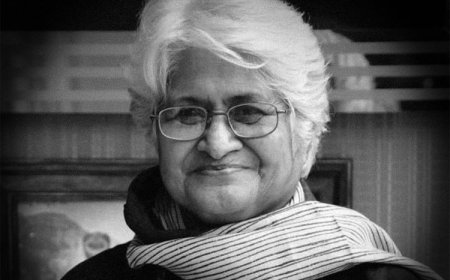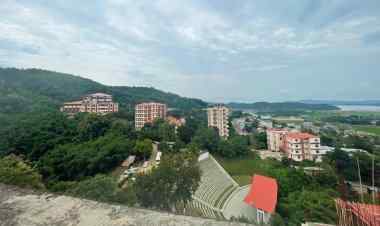Aikyatan: On the threshold of the Golden Jubilee
Film critic Prantik Deka writes on Pabitra Kumar Deka, a satirical writer, editor of Roopkar magazine and employee of The Assam Tribune, who founded a theatre group called Aikyatan in 1976.
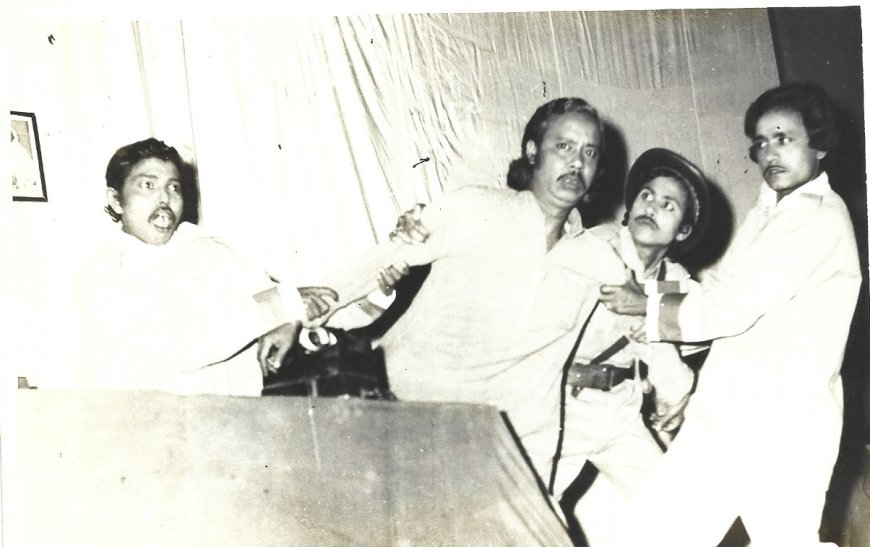
In 1976, Pabitra Kumar Deka, a satirical writer, editor of Roopkar magazine and employee of The Assam Tribune, founded a theatre group called Aikyatan. Other collaborators included then LIC employee, writer Nitya Bora, Cotton College lecturers Udayaditya Bharali, Pradip Acharya, Biswajit Chakraborty, child specialist Dr. Gakul Bora, music teacher Loknath Subba, and The Assam Tribune employee and book publisher Anil Deka.
Nabakanta Barua, Tilak Hazarika, Kulada Kumar Bhattacharjee, Ratna Ojah, Dr. Nirmal Prabha Bordoloi, Krishnamurti Hazarika, Garima Hazarika, Indra Bania, and Chandan Chutia, among others, served as advisors in various capacities. The theatre group was formerly known as Naxa Natya Parishad in the late 1960s.
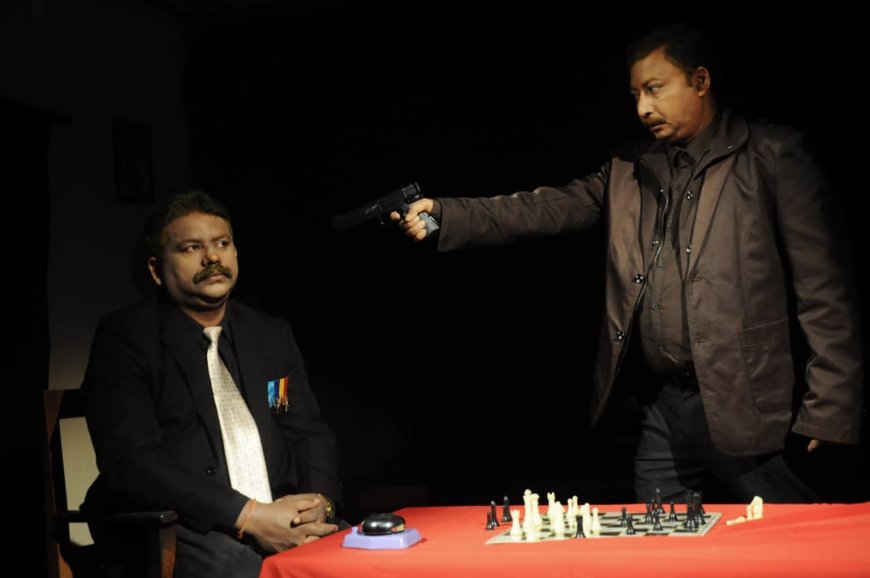
Early Productions
The theatre group’s most famous production was the Assamese translation of Bertolt Brecht’s play ‘Ma’ based on Maxim Gorky’s famous novel ‘The Mother’. In 1974, the theatre troupe set a record by staging the play for four consecutive nights at the District Library Hall in Guwahati, in full Brechtian style. ‘Ma’ was translated by Pabitra Kumar Deka, directed by Ratna Oja, advised by Kulada Kumar Bhattacharjee, with music by Dr. Bhupen Hazarika, lighting by Hiramon Goswami, and costumes by Garima Hazarika. Collaborators included Hemen Hazarika and Jayanta Hazarika, while the cast featured Bina Prasad, Amala Kotoky, Ishaan Barua, Kamal (Rana) Sarma, Deben Dutta, Indibor Deuri, Atul Bordoloi, Amarjyoti Choudhary, Domboru Das, Bhaben Bez, Hem Bhattacharya, Gautam Prasad Baruah, Munin Bhuyan, Rabindra Sarkar and Ridip Dutta.
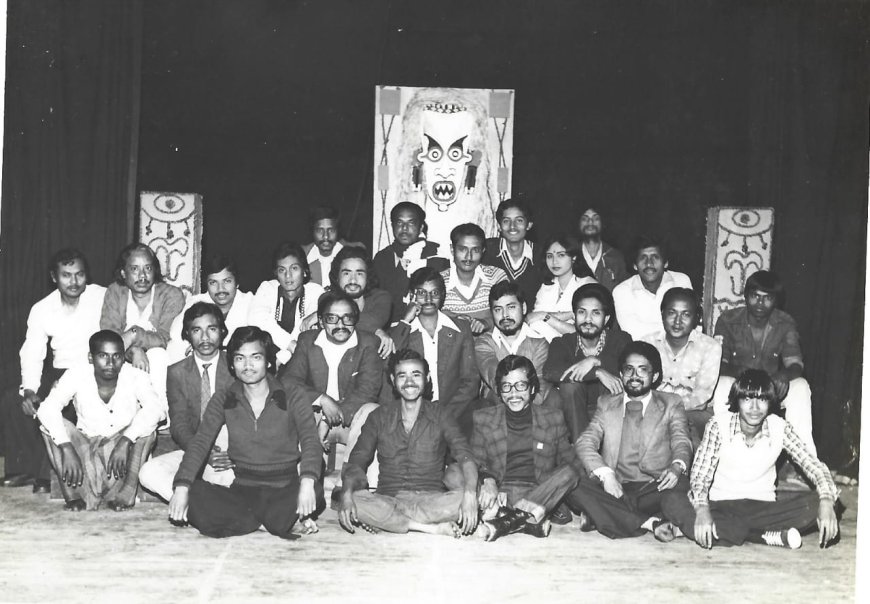
In the same year, Naxa Natya Parishad invited Kolkata’s People’s Little Theatre (PLT) for performances of ‘Kolkatar Hamlet’, ‘Mrityuhin Pran’, and ‘1799’, followed by a session with lighting maestro Tapas Sen, filmmaker Mrinal Sen and author and political activist Hemanga Biswas.
The Progressive 1970s
In 1976, at its very inception, Aikyatan presented two distinct dramas: ‘Dhanoni’, penned by the renowned playwright Ratan Ghosh and directed by Ratna Ojha, and ‘Jukti-Tarko’, a play by Albert Camus, translated and directed by the experienced theatre director Dulal Roy. In a self-centred societal framework, ‘Jukti-Tarko’ poignantly narrates how the insatiable desire for consumption dehumanises individuals, transforming mothers, sons, and daughters into adversaries of one another. ‘Dhanoni’ elucidated a framework through which ordinary individuals, championing the cause of revolution, could establish a system enabling them to fully and unreservedly partake in the benefits of their efforts.
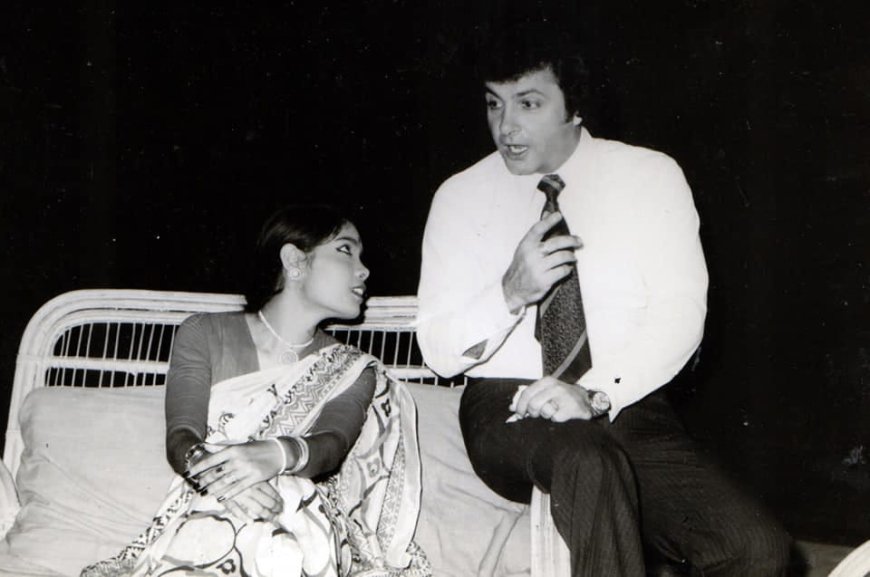
In that very year, Aikyatan founded a music school ‘Aikyatan Sangeet Vidyalay’ grounded in both Indian and Western classical traditions, offering training in both vocal and instrumental music. The institution nurtured the growth of many proficient artistes, and the musical performances they performed at various events continue to receive popular acclaim to this day.
Subsequently, Aikyatan presented a full-fledged children’s play titled ‘Akonihotor Suwoni Desh’. The central theme revolved around how the small children, united, fought to protect their beloved flower garden from the grasp of a giant who forcefully plucked flowers from it. The play was written by Tarun Sarma and directed by actor Pranjal Saikia, a graduate of the National School of Drama at the time.
In 1978, Aikyatan staged ‘Ahatgurir Natun Baat’, a play written by playwright Mahendra Borthakur. It was directed by Nilu Chakravarty. A play that pledges the forging of a new path by a new generation, forsaking the antiquated social system and obsolete superstitions.
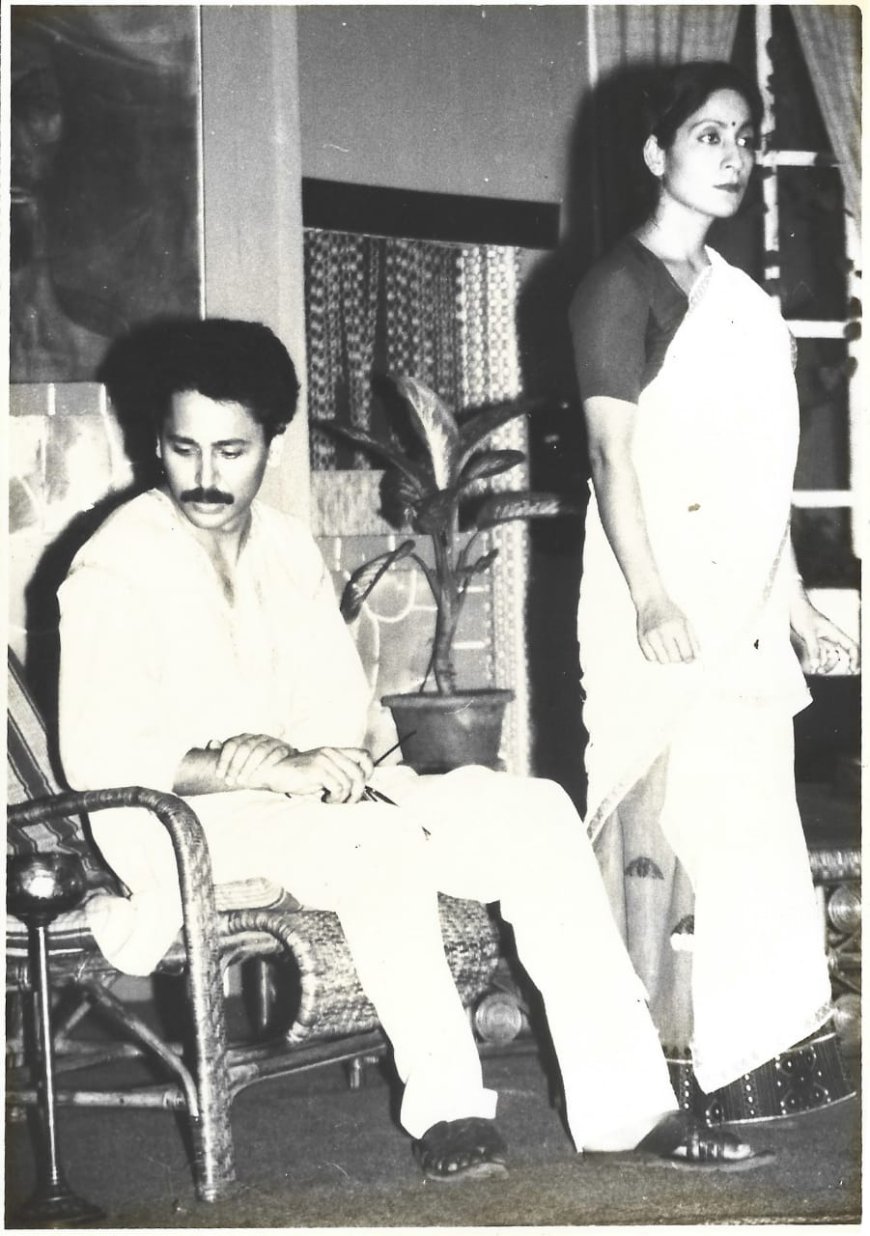
In that same year, Aikyatan presented two plays over a span of four days: ‘Janani’, written by Arati Das (Boiragi), and ‘Surjastak’, a Hindi play by C. R. Das of Odisha, which has achieved pan-Indian acclaim. The subject matter of ‘Janani’ revolved around the conflict of ideals between a mother and her son. For the first time, ‘Surjastak’, signifying the twilight preceding sunset, was performed on a Guwahati stage in the Hindi language, featuring local non-Hindi speaking actors and actresses. The backdrop of the play was the illusory hopes and aspirations of middle-class life. Ranjit Das, George Baker, Seba Roy, and Abha Hazarika played their roles with enthusiasm and credibility. Both the plays were directed by Govind Gupta, a graduate of the National School of Drama, Delhi. Regarding ‘Surjastak’, director Gupta offered his insights in the following manner: “The play ‘Surjastak’ struck me as something significant due to its inherent dramatic element. The technique appeared remarkably modern to me, particularly the characterisation within the play, which resonated deeply with my sensibilities. Furthermore, the thematic movements in the script were finely tuned to their zenith. Ideologically, the play, being existential in its orientation, nevertheless depicts the plight of an individual intellectually marooned.”
The Late 1970s and 1980s
In 1979, Aikyatan presented the play ‘Ganapotir Haasi’, an adaptation of Neil Grant’s satirical work ‘The Man Who Thought for Himself’, translated and directed by Pabitra Kumar Deka. In the same year, dance director Garima Hazarika trained children for about six months, culminating in the performance of the complete children’s opera ‘Panchatantra’, which is inspired by Indian folk tales and various moral stories. This opera was presented twenty times in Guwahati and other locations. An English version of the ‘Panchatantra’ was also staged for the delegates from outside Assam at the All India ‘Roads Congress’ session held in Guwahati. The opera’s musical advisor was Jugal Das, with musical direction provided by Loknath Subba. The melodies were composed by Bibhu Ranjan Choudhury, while lighting design was executed by Hiramon Goswami, with assistance from OP Nayyar, Ram Hazarika, Prem Prasad, and Nayan Prasad. Around 40 children, including Indra Bania, took part in this opera, achieving a remarkable milestone at that time.
A vacant throne. However, a throne cannot remain vacant indefinitely. It requires a worthy individual to occupy it. An individual who wholeheartedly believes in the ideals of truth, non-violence, and justice is the one deemed worthy. Yet, a worthy person is still nowhere to be found. The greed for the throne, the lust for power, has blurred the line between the worthy and the unworthy. Conflicts occur frequently, leading to conspiracy, struggle, and even murder. In the early 1980s, Aikyatan showcased ‘Sinhashan Khali’, an Assamese version of Sushil Kumar Singha’s original Hindi play. The adaptation and direction were handled by Krishnamurti Hazarika.
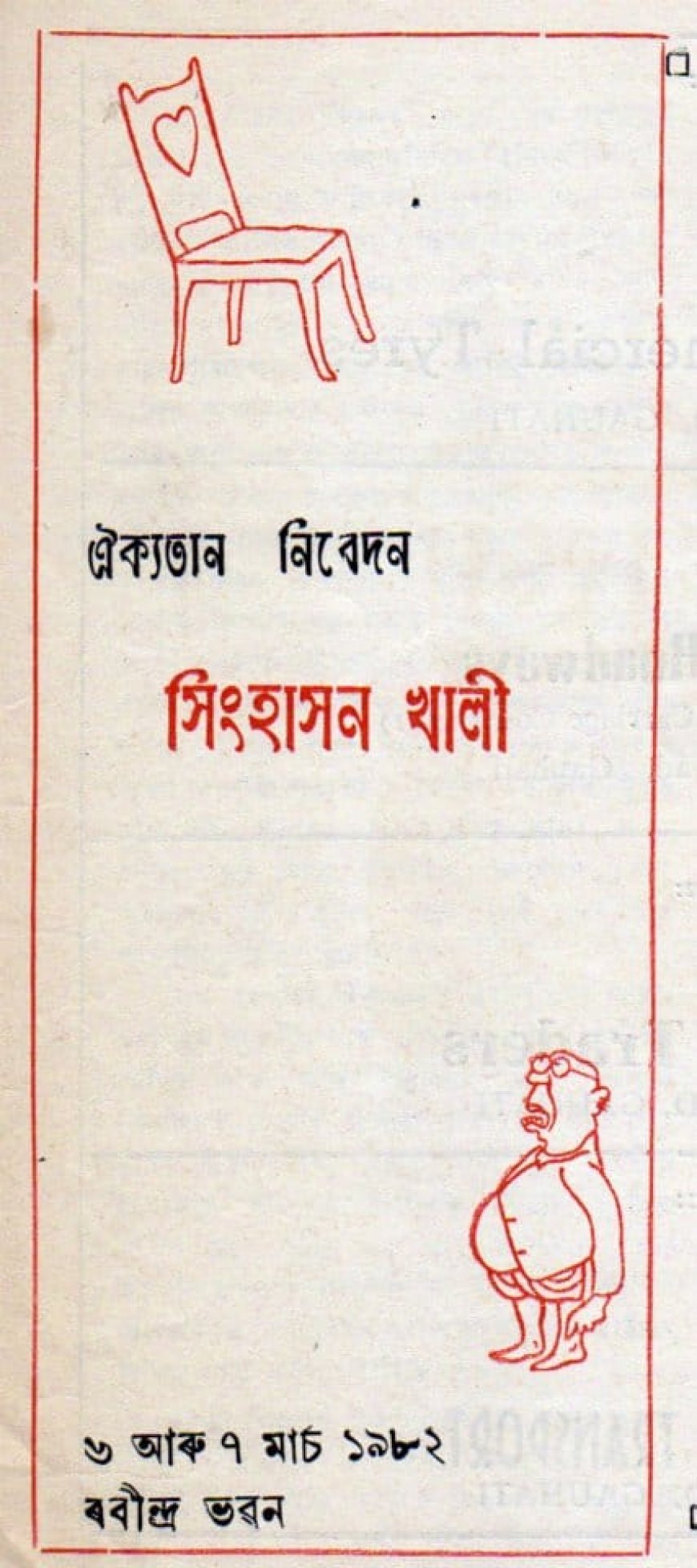
A Hub of Intellectual Exchange
In addition to routine theatrical rehearsals, Aikyatan facilitated an intellectual forum that often stretched late into the night. This forum attracted a diverse array of luminaries, such as Hiren Gohain, the poet Hiren Bhattacharyya, Padma Barkataki, Lakshmi Nandan Bora, Loknath Goswami, Pulok Gogoi, Deben Dutta, Biju Phukan, Dr. Samujjal Kumar Bhattacharya, and various other distinguished personalities. Notable regular attendees of Aikyatan were Nitya Bora and Udayaditya Bharali.
In the vibrant early 1980s, a bunch of spirited young men studying at esteemed institutions like B. Borooah College and Cotton College, among others, also found their way into these gatherings. They were Dhrubajit Kishore Choudhury (Bhaya Mama), Sanjeev Hazorika, Surajit Gogoi, Prabin Hazarika, Moinul Haque, Jayanta Das, Bidyut Chakraborty, Dilip Ranjan Dutta, etc. With the enthusiastic participation of this vibrant group, Aikyatan progressed to showcase two captivating stage performances – ‘Natak Holeu Natak Nohoy’ (Though a Play, But Not Quite), penned by Tarun Saikia, and ‘Hewers of Coal’ crafted by Joe Corrie. Both the plays were directed by Sanjeev Hazorika.
Furthermore, ‘Aikyatan’, taking part in the All Assam Jyotirupa One-Act Play Competition, managed to secure the prestigious awards for Best Production and Best Direction with their remarkable performance of ‘Natak Holeu Natak Nohoy’. Later, Aikyatan staged ‘Dweep’, written by Himendra Borthakur, and ‘Potola Naach’, written by Dr. Bhabendra Nath Saikia, at Jyotirupa, with both plays receiving accolades in various categories.
In 1984, Aikyatan staged ‘Upahar’, a play by Natya Prabar Saradakanta Bordoloi that focused on the unity and harmony between Hindus and Muslims. The play was directed by Krishnamurti Hazarika.
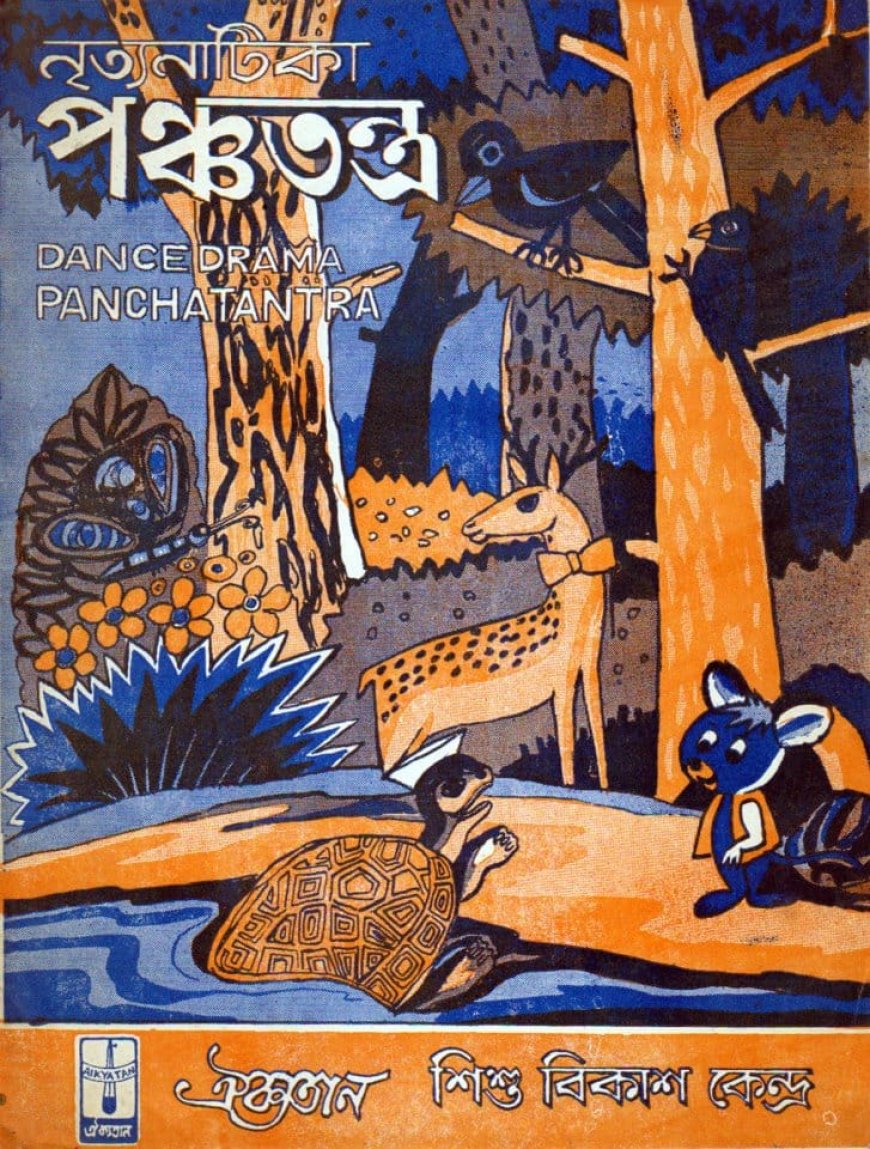
After this play, for various reasons, Aikyatan was unable to stage a full-length drama for several years. Nonetheless, in the same year, they extended an invitation to the amateur theatre group ‘Bijoy Sangha’ based in Dibrugarh to stage Munin Sharma’s play ‘Chorus’, which he both authored and directed, over the course of two evenings. Subsequently, they facilitated a discussion forum featuring theatre practitioners from Guwahati.
Similarly, in 1985, Aikyatan showcased a mesmerising event by hosting the internationally acclaimed ballet troupe of Uday Shankar, known as the Uday Shankar School of Dance and Music Ballet Unit. The enchanting spectacle of ‘Ram Leela’, a captivating shadow dance-drama, graced the stage of Guwahati for four consecutive nights, marking a historic first for the city.
1989–1990: New Directions and the Decline
After a period of inactivity, Aikyatan revived its theatrical activities by presenting a production of Ayn Rand’s acclaimed play, ‘The Night of January 16th’, in the year 1989. The play was translated by Utpal Datta and directed by Sanjeev Hazorika. As the play prepared to grace the stage, many voices rose in question – “Will Aikyatan really stage a play about capitalist society?” In response, Pabitra Kumar Deka wrote – “The influence of capitalist society has profoundly affected developing countries in the Third World. India or Assam are no exceptions to this. Consequently, society is detached from social life. There is a general ambivalence towards human values among individuals. This situation is prevalent everywhere. Therefore, it seems that the play has attained a universal form in this era.”
The entire drama is set within a courtroom, wherein a murder trial unfolds, culminating in the pronouncement of a verdict by the court. This verdict is fundamentally determined by the jury’s deliberations and subsequent decision. On each of the five nights of the play’s performance, a selection of audience members are invited to act as jurors, who then deliver a final verdict: guilty or not guilty? The play boasted a cast as captivating as the drama itself — Tapan Das, Triveni Goswami, Nayan Prasad, Surajit Gogoi, Tilak Das, Simanta Bhagawati, Prabin Hazarika, Joan Dutta, Jayanta Bhagawati, Munin Das, Enu Boruah, Moushumie Kathkatia and Bhargav Kataky. It is noteworthy that the play ‘The Night of January 16th’ was broadcast on Guwahati Doordarshan Kendra on March 27, 1990, on the occasion of World Theatre Day.
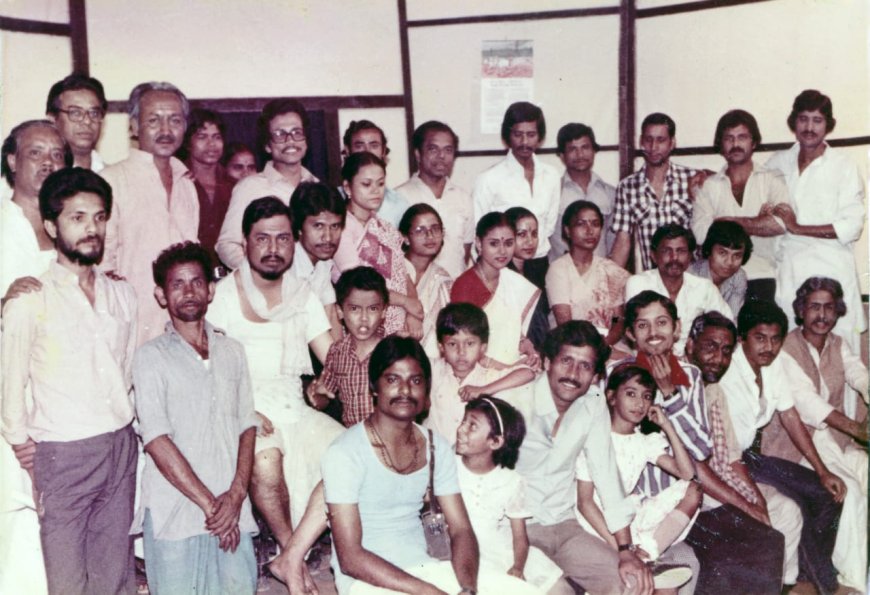
In 1990, Aikyatan presented ‘Potola Ghar’ (A Doll’s House), an adaptation of Henrik Ibsen’s world-renowned play. The adaptation was by Padma Barkataki, with direction by Sanjeev Hazorika. When a married woman is unable to access her rightfully due opportunities within a patriarchal system, she may ultimately find herself compelled to make the difficult decision to step out of the dollhouse. The principal roles were brought to life with finesse by Dr. Santwana Bordoloi, Tapan Das, Surajit Gogoi, and Nayan Prasad. This was the final full-fledged theatrical production of Aikyatan.
In 1991, after an intensive month-long workshop and training programme led by mime artiste Moinul Haque, Aikyatan collaborated with Niranjan Goswami, Director of the Indian Mime Theatre, Kolkata to stage ‘Mukabhinoy Sandhiya’ which included a pantomime play ‘Gabhait Chor’ (Petty Thief) that was brought to life through expressive gestures and subtle movements, complemented by a variety of mime performances.
Over time, the substantial rise in the budget allocated for drama production, coupled with the increased professional commitments of various Aikyatan members, ultimately led to the cessation of theatrical production activities.
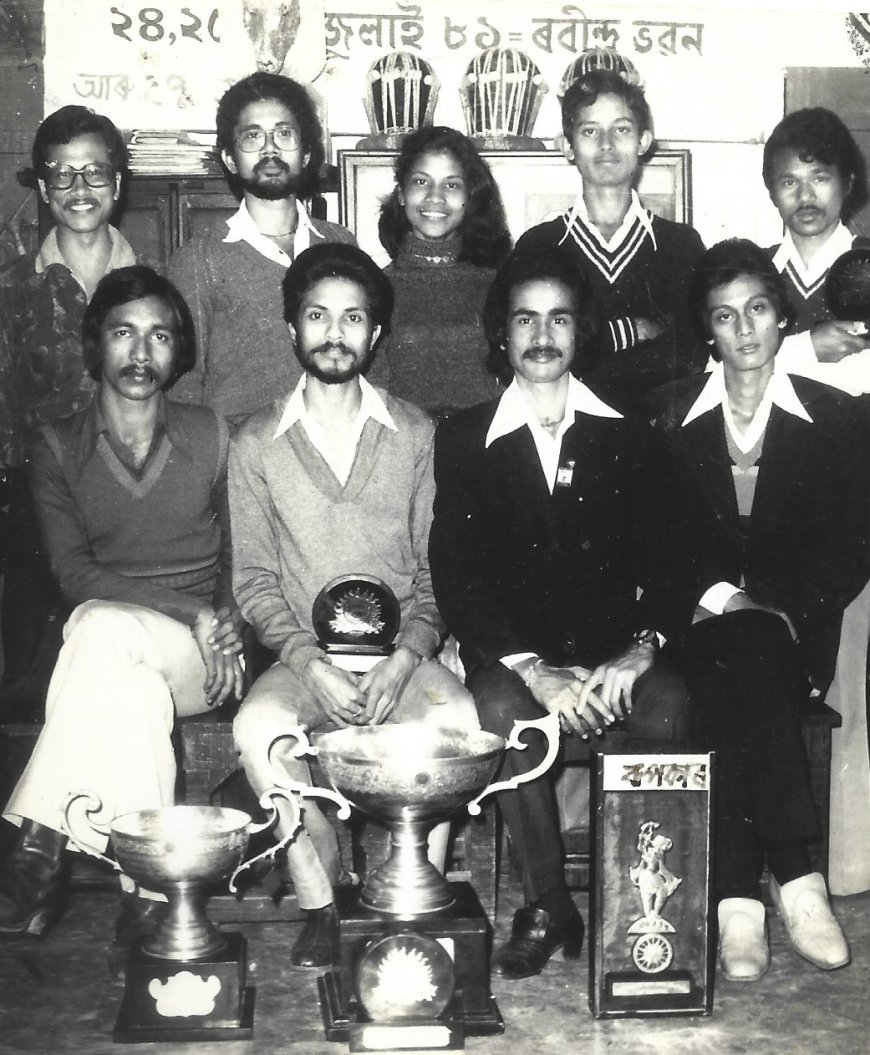
Revival and New Era
Aikyatan is an organisation focused on promoting progressive ideas and cultivating a culturally inclusive atmosphere on a global scale through a range of cultural initiatives. In 2015, with the cooperation of some theatre workers and well-wishers, Aikyatan was revived to initiate theatre productions in an intimate style. The initial production was an adaptation of Rupert Brooke’s renowned play ‘Lithuania’, rendered as ‘Apekhyat’ in Assamese. This adaptation was translated by Prodyut Kumar Deka and directed by Pankaj Kalita. The play holds significant social, political, and economic relevance, as the initial motive behind the intended murder of the guest in the original narrative stemmed from the family’s desperation to escape their impoverished circumstances.
To mark its 40th anniversary in 2016, Aikyatan performed ‘Junakor Puhor’, an Assamese rendition of ‘The Rising of the Moon’, a famous play written by Lady Gregory, a prominent Irish playwright. The play is translated and directed by Prodyut Kumar Deka. A sergeant of Irish descent, currently a member of the English police force, once harboured aspirations for Ireland’s independence in his youth. However, he now performs his duties with unwavering dedication as a member of the police force under the foreign English regime. Consequently, he exhibits a strong motivation to obtain the 100-pound bounty offered by the government for the capture of a powerful Irish revolutionary. However, when the revolutionary confronted the sergeant directly, an internal psychological conflict arose within the sergeant, leading to the resurgence of previously suppressed sentiments of patriotism in his consciousness. This, in essence, was the heart of the play. The play was enhanced by musical compositions and songs contributed by Kishour Giri, musician and former member of Aikyatan.
In the February 19th edition of that year’s Sadin newspaper, Saroj Medhi penned a review stating, “The persona of this masked revolutionary, who profoundly stirs even the resolute sergeant through astute dialogue, subtle acting techniques, and melodious singing, has been vividly brought to life by the eminent actor Joan Dutta. The portrayal of the sergeant, performed with remarkable authenticity by the multifaceted actor Mrinal Das, thoroughly engaged the audience from the opening scene until the final act, holding their attention throughout.”
Aikyatan’s subsequent production, ‘The Game of Chess’, highlights the primary theme concerning the subjugation of the general populace by the Bourgeois class, as well as the suppression of the revolutionary fervour that rises in opposition to this exploitation and oppression. The play by Kenneth Sawyer Goodman has been translated and directed by Prodyut Kumar Deka.
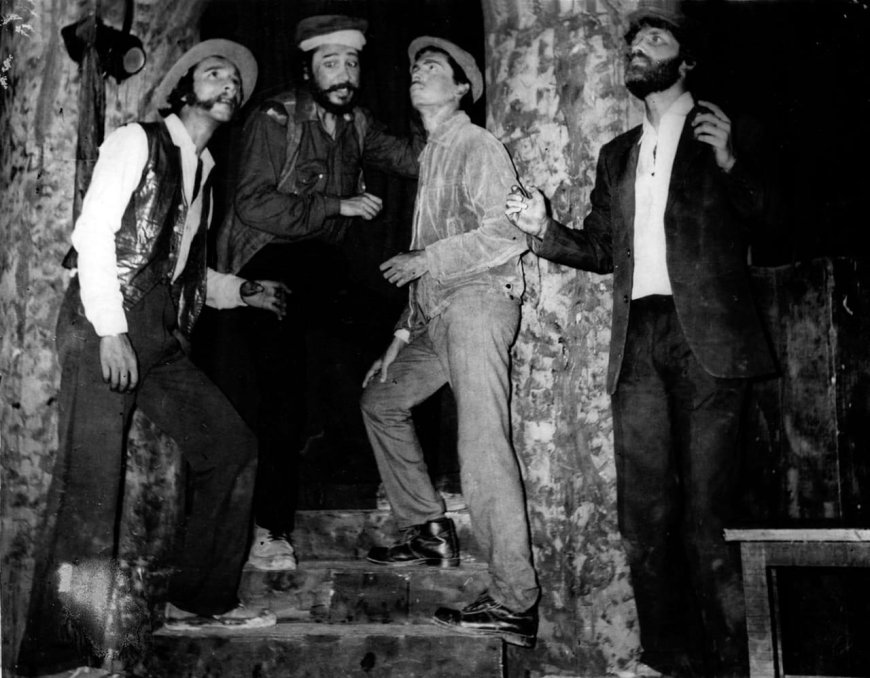
In the December 11, 2018 issue of The Assam Tribune newspaper, Kalpajyoti Bhuyan writes – “The adaptation retains the aura of the enigmatic situations of the three individuals and a game of chess which makes it an absorbing experience to sit through. The audience was deeply engaged in the dialogue as the characters battled amongst themselves to prove their positions.”
From its inception, Aikyatan maintained a close association with the Indian People’s Theatre Association (IPTA). Earlier, it played a significant role in the production of the play ‘Rifle’, directed by Soudagar.
In 2019, the Guwahati District Library Auditorium hosted a theatre festival on March 11th and 12th to celebrate the 75th anniversary of the Indian People’s Theatre Association. Aikyatan presented ‘Coffee Housot Apeksha’, a theatrical reinterpretation of the Hindi play ‘Coffee House Me Intezar’, originally written by the eminent playwright Laxminarayan Lal. This adaptation was translated into Assamese by the renowned playwright and actor Durgeswar Borthakur, with direction by Prodyut Kumar Deka. It is worth mentioning that Udayaditya Bharali, Assam’s distinguished intellectual, served as the president of the Assam State Committee of the Indian People’s Theatre Association at that time, having previously played a significant role in organising Aikyatan.
After a prolonged hiatus due to the Covid pandemic, the Assamese rendition of Tennessee Williams’ acclaimed play ‘27 Wagons Full of Cotton’, renamed as ‘27 Gaari Kopah’, was revived at the intimate Surjya Club Auditorium. The translation was done by Suresh Kumar and directed by Prodyut Kumar Deka.
The journey of Aikyatan continues – marked by moments of brilliance and phases of quiet reflection. Through all its evolutions, the passion, ideals, and creative energy that once ignited the group remain steadfast, illuminating Assam’s cultural horizon for half a century.
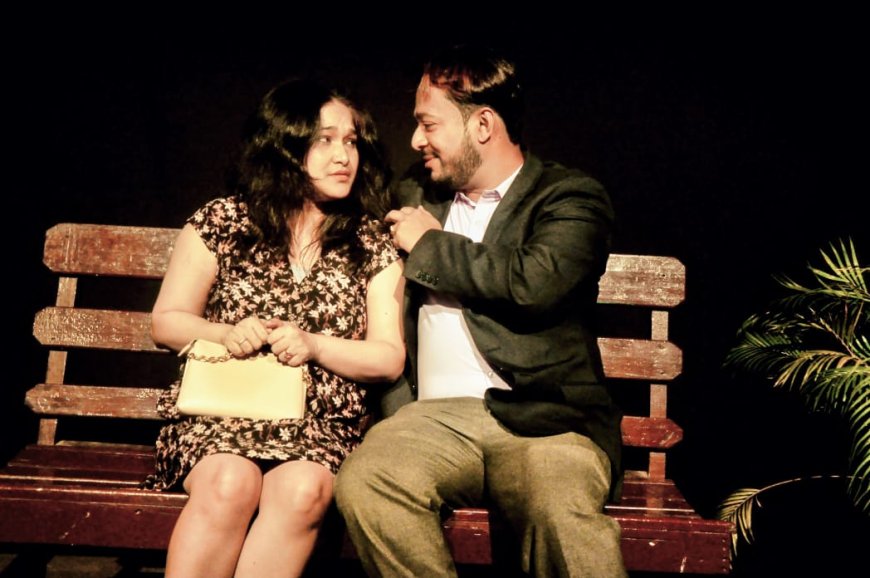
What's Your Reaction?





















































